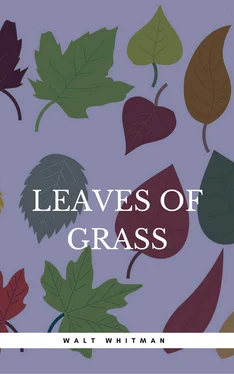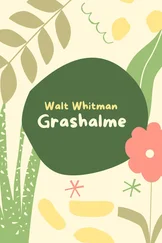Walt Whitman - Leaves of Grass
Здесь есть возможность читать онлайн «Walt Whitman - Leaves of Grass» — ознакомительный отрывок электронной книги совершенно бесплатно, а после прочтения отрывка купить полную версию. В некоторых случаях можно слушать аудио, скачать через торрент в формате fb2 и присутствует краткое содержание. ISBN: , Жанр: Языкознание, Критика, на английском языке. Описание произведения, (предисловие) а так же отзывы посетителей доступны на портале библиотеки ЛибКат.
- Название:Leaves of Grass
- Автор:
- Жанр:
- Год:неизвестен
- ISBN:9782377930524
- Рейтинг книги:4 / 5. Голосов: 1
-
Избранное:Добавить в избранное
- Отзывы:
-
Ваша оценка:
- 80
- 1
- 2
- 3
- 4
- 5
Leaves of Grass: краткое содержание, описание и аннотация
Предлагаем к чтению аннотацию, описание, краткое содержание или предисловие (зависит от того, что написал сам автор книги «Leaves of Grass»). Если вы не нашли необходимую информацию о книге — напишите в комментариях, мы постараемся отыскать её.
Leaves of Grass — читать онлайн ознакомительный отрывок
Ниже представлен текст книги, разбитый по страницам. Система сохранения места последней прочитанной страницы, позволяет с удобством читать онлайн бесплатно книгу «Leaves of Grass», без необходимости каждый раз заново искать на чём Вы остановились. Поставьте закладку, и сможете в любой момент перейти на страницу, на которой закончили чтение.
Интервал:
Закладка:
Up to the present, as helps best, the people, like a lot of large boys, have no determined tastes, are quite unaware of the grandeur of themselves, and of their destiny, and of their immense strides—accept with voracity whatever is presented them in novels, histories, newspapers, poems, schools, lectures, every thing. Pretty soon, through these and other means, their development makes the fibre that is capable of itself, and will assume determined tastes. The young men will be clear what they want, and will have it. They will follow none except him whose spirit leads them in the like spirit with themselves. Any such man will be welcome as the flowers of May. Others will be put out without ceremony. How much is there anyhow, to the young men of These States, in a parcel of helpless dandies, who can neither fight, work, shoot, ride, run, command—some of them devout, some quite insane, some castrated—all second-hand, or third, fourth, or fifth hand—waited upon by waiters, putting not this land first, but always other lands first, talking of art, doing the most ridiculous things for fear of being called ridiculous, smirking and skipping along, continually taking off their hats—no one behaving, dressing, writing, talking, loving, out of any natural and manly tastes of his own, but each one looking cautiously to see how the rest behave, dress, write, talk, love—pressing the noses of dead books upon themselves and upon their country—favoring no poets, philosophs, literats here, but dog-like danglers at the heels of the poets, philosophs, literats, of enemies’lands—favoring mental expressions, models of gentlemen and ladies, social habitudes in These States, to grow up in sneaking defiance of the popular substratums of The States? Of course they and the likes of them can never justify the strong poems of America. Of course no feed of theirs is to stop and be made welcome to muscle the bodies, male and female, for Manhattan Island, Brooklyn, Boston, Worcester, Hartford, Portland, Montreal, Detroit, Buffalo, Cleaveland, Milwaukee, St. Louis, Indianapolis, Chicago, Cincinnati, Iowa City, Philadelphia, Baltimore, Releigh, Savannah, Charleston, Mobile, New Orleans, Galveston, Brownsville, San Francisco, Havana, and a thousand equal cities, present and to come. Of course what they and the likes of them have been used for, draws toward its close, after which they will all be discharged, and not one of them will ever be heard of any more.
America, having duly conceived, bears out of herself offspring of her own to do the workmanship wanted. To freedom, to strength, to poems, to personal greatness, it is never permitted to rest, not a generation or part of a generation. To be ripe beyond further increase is to prepare to die. The architects of These States laid their foundations, and passed to further, spheres. What they laid is a work done; as much more remains. Now are needed other architects, whose duty is not less difficult, but perhaps more difficult. Each age forever needs architects. America is not finished, perhaps never will be; now America is a divine true sketch. There are Thirty-Two States sketched—the population thirty millions. In a few years there will be Fifty States. Again in a few years there will be A Hundred States, the population hundreds of millions, the freshest and freest of men. Of course such men stand to nothing less than the freshest and freest expression.
Poets here, literats here, are to rest on organic different bases from other countries; not a class set apart, circling only in the circle of themselves, modest and pretty, desperately scratching for rhymes, pallid with white paper, shut off, aware of the old pictures and traditions of the race, but unaware of the actual race around them—not breeding in and in among each other till they all have the scrofula. Lands of ensemble, bards of ensemble! Walking freely out from the old traditions, as our politics has walked out, American poets and literats recognize nothing behind them superior to what is present with them—recognize with joy the sturdy living forms of the men and women of These States, the divinity of sex, the perfect eligibility of the female with the male, all The States, liberty and equality, real articles, the different trades, mechanics, the young fellows of Manhattan Island, customs, instincts, slang, Wisconsin, Georgia, the noble Southern heart, the hot blood, the spirit that will be nothing less than master, the filibuster spirit, the Western man, native-born perceptions, the eye for forms, the perfect models of made things, the wild smack of freedom, California, money, electrictelegraphs, free-trade, iron and the iron mines—recognize without demur those splendid resistless black poems, the steam-ships of the sea-board states, and those other resistless splendid poems, the locomotives, followed through the interior states by trains of rail-road cars.
A word remains to be said, as of one ever present, not yet permitted to be acknowledged, discarded or made dumb by literature, and the results apparent. To the lack of an avowed, empowered, unabashed development of sex, (the only salvation for the same,) and to the fact of speakers and writers fraudulently assuming as always dead what every one knows to be always alive, is attributable the remarkable non-personality and indistinctness of modern productions in books, art, talk; also that in the scanned lives of men and women most of them appear to have béen for some time past of the neuter gender; and also the stinging fact that in orthodox society today. if the dresses were changed, the men might easily pass for women and the women for men.
Infidelism usurps most with fœtid polite face; among the rest infidelism about sex. By silence or obedience the pens of savans, poets, historians, biographers, and the rest, have long connived at the filthy law, and books enslaved to it, that what makes the manhood of a man, that sex, womanhood, maternity, desires, lusty animations, organs, acts, are unmentionable and to be ashamed of, to be driven to skulk out of literature with whatever belongs to them. This filthy law has to be repealed—it stands in the way of great reforms. Of women just as much as men, it is the interest that there should not be infidelism about sex, but perfect faith. Women in These States approach the day of that organic equality with men, without which, I see, men cannot have organic equality among themselves. This empty dish, gallantry, will then be filled with something. This tepid wash, this diluted deferential love, as in songs, fictions, and so forth, is enough to make a man vomit; as to manly friendship, everywhere observed in The States, there is not the first breath of it to be observed in print. I say that the body of a man or woman, the main matter, is so far quite unexpressed in poems; but that the body is to be expressed, and sex is. Of bards for These States, if it come to a question, it is whether they shall celebrate in poems the eternal decency of the amativeness of Nature, the motherhood of all, or whether they shall be the bards of the fashionable delusion of the inherent nastiness of sex, and of the feeble and querulous modesty of deprivation. This is important in poems, because the whole of the other expressions of a nation are but flanges out of its great poems. To me, henceforth, that theory of any thing, no matter what, stagnates in its vitals, cowardly and rotten, while it cannot publicly accept, and publicly name, with specific words, the things on which all existence, all souls, all realization, all decency, all health, all that is worth being here for, all of woman and of man, all beauty, all purity, all sweetness, all friendship, all strength, all life, all immortality depend. The courageous soul, for a year or two to come, may be proved by faith in sex, and by disdaining concessions.
To poets and literats—to every woman and man, today or any day, the conditions of the present, needs, dangers, prejudices, and the like, are the perfect conditions on which we are here, and the conditions for wording the future with undissuadable words. These States, receivers of the stamina of past ages and lands, initiate the outlines of repayment a thousand fold. They fetch the American great masters, waited for by old worlds and new, who accept evil as well as good, ignorance as well as erudition, black as soon as white, foreign-born materials as well as home-born, reject none, force discrepancies into range, surround the whole, concentrate them on present periods and places, show the application to each and any one’s body and soul, and show the true use of precedents. Always America will be agitated and turbulent. This day it is taking shape, not to be less so, but to be more so, stormily, capriciously, on native principles, with such vast proportions of parts! As for me, I love screaming, wrestling, boiling-hot days.
Читать дальшеИнтервал:
Закладка:
Похожие книги на «Leaves of Grass»
Представляем Вашему вниманию похожие книги на «Leaves of Grass» списком для выбора. Мы отобрали схожую по названию и смыслу литературу в надежде предоставить читателям больше вариантов отыскать новые, интересные, ещё непрочитанные произведения.
Обсуждение, отзывы о книге «Leaves of Grass» и просто собственные мнения читателей. Оставьте ваши комментарии, напишите, что Вы думаете о произведении, его смысле или главных героях. Укажите что конкретно понравилось, а что нет, и почему Вы так считаете.












